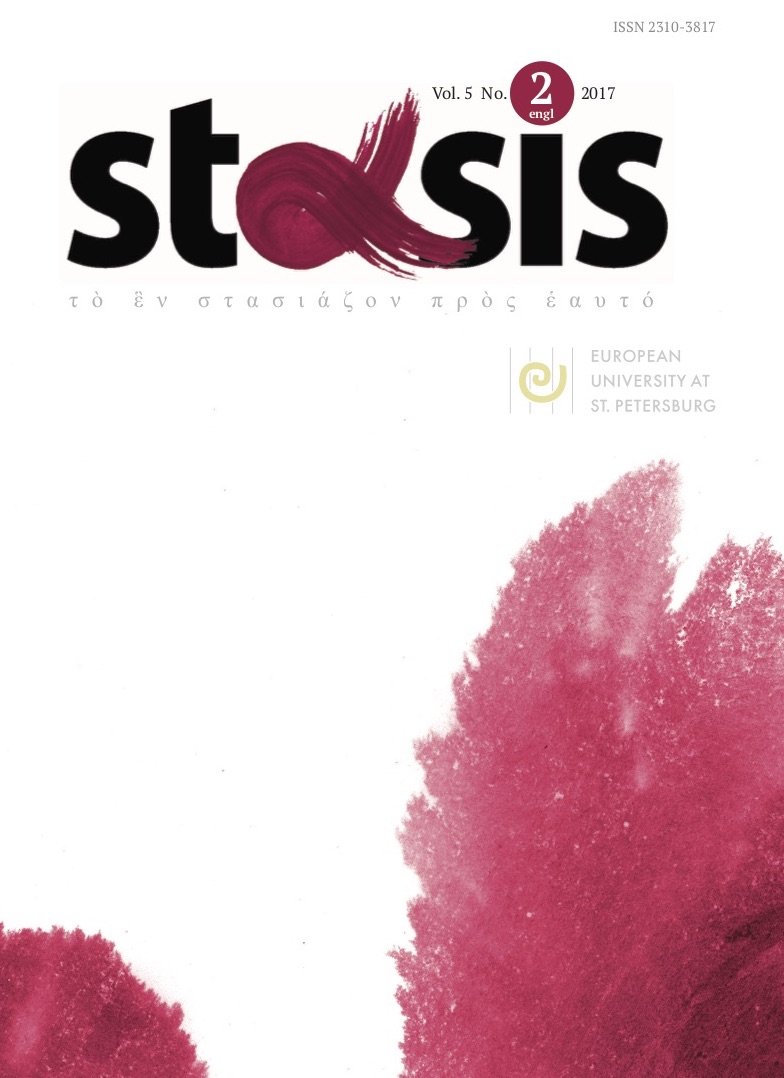Диалектика истории Бориса Поршнева
Аннотация
В статье исследуется наследие Бориса Поршнева, выдающегося советского мыслителя-марксиста, который внес вклад в историю, психологию, физиологию и философию с сугубо диалектической перспективы. Поршнев разработал новую гипотезу происхождения человека. Он связал это происхождение с появлением языка, который служил 1) как средство взаимного подчинения и 2) как средство сопротивления подчинению. Яркая, почти мифическая картина праистории человечества в то же время приобрела научную строгость благодаря последовательной диалектической аргументации. Эта аргументация, в отличие от общепринятой советской догмы «диалектического материализма», выдвигает негативность как особую силу и момент развития, а негативность принимает форму противоположности. В статье обсуждается значение теории Поршнева в международном контексте, а также в широком контексте советской недогматической философии и в то же время разрабатывается общая теория негативности.
Литература
Badiou, Alain (2005). Being and Event. Trans. Oliver Feltham. London: Continuum.
Bakhtin, Mikhail (1968). Rabelais and His World. Bloomington: Indiana University Press.
Bickerton, Derek (1981). The Roots of Language. Ann Arbor, MI: Karoma.
Bogdanov, Konstantin (2015). Vox populi. Folklornye zhanry Sovetskoy kultury [Vox populi. Folklore genres of Soviet culture]. Moscow: Novoe Literaturnoe Obozrenie.
Braidotti, Rosi (2013). The Posthuman. Cambridge: Polity Press.
Brandenberger, David (2010). “Stalin’s Populism and the Accidental Creation of Russian National Identity.” Nationalities Papers 38.5: 723–39.
Byrne, Richard, and Andrew Whiten, eds. (1988). Machiavellian Intelligence. Social Expertise and the Evolution of Intellect in Monkeys, Apes, and Humans. Oxford: Clarendon Press.
Cann, Rebecca, Mark Stoneking, and Allan Wilson (1987). “Mitochondrial DNA and Human Evolution.” Nature 325: 31–36.
Celan, Paul (1986). Gesammelte werke in fünf bänden. Frankfurt am Main: Suhrkamp. Clastres, Pierre (1989). Society Against the State. Cambridge, MA: MIT Press. Clastres, Pierre (2010). Archeology of Violence. Cambridge, MA: MIT Press.
Deacon, Terrence (1997). The Symbolic Species: The Co-evolution of Language and the Brain. New York: Norton.
Dunbar, Robin (1996). Grooming, Gossip and the Evolution of Language. Cambridge, MA: Harvard University Press.
Forster, Peter, and Shuichi Matsumura (2005). “Did Early Humans Go North or South?” Science 308.5724: 965–66.
Foucault, Michel (1972), Archeology of Knowledge. Trans. N. Sheridan. London: Tavistock Publications.
Foucault, Michel (2015a). Punitive Society. Trans. Graham Burchell. New York: Palgrave MacMillan.
Foucault, Michel (2015b). Théories et institutions pénales. Paris: Seuil.
Franklin, Michael, and Michael Zyphur (2005). “The Role of Dreams in the Evolution of the Human Mind.” Evolutionary Psychology 3: 60–78.
Freud, Sigmund (1999). Totem and Taboo. New York: Psychology Press.
Gallese, Vittorio, Luciano Fadiga, Leonardo Fogassi, and Giacomo Rizzolatti (1996). “Action Recognition in the Premotor Cortex.” Brain. 119.2: 593–609.
Gehlen, Arnold (1988). Man, His Nature, and his Place in the World. New York: Columbia University Press.
Haraway, Donna (1991). Simians, Cyborgs and Women: The Reinvention of Nature. New York: Routledge.
Heidegger, Martin (1962). Being and Time. Trans. John McQuarrie and Edward Robin son. New York: Harper and Row.
Heidegger, Martin (1995). The Fundamental Concepts of Metaphysics. World, Finitude, Solitude. Trans. William McNeill, Nicholas Walker. Bloomington: Indiana University Press.
Ilyenkov, Evald (2017). “Cosmology of Spirit” Stasis (forthcoming).
Knight, Chris (1998). “Ritual/Speech Coevolution: A Solution to the Problem of Deception.” In Approaches to the Evolution of Language, eds. James R Hurford, Michael Studdert- Kennedy, and Chris Knight, 68–93. Cambridge: Cambridge University Press.
Kondratieva, Tamara (2012). “B. F. Porshnev chitaet Bakunina” [B. F. Porshnev reads Bakunin]. Vestnik Tiumenskogo Universiteta. Seriia Istoria [Tyumen University bul letin. History series] 2: 210–14.
Kozintsev, Alexander (2010). The Mirror of Laughter. New Brunswick, NJ: Transaction Publishers.
Leatherbarrow, William, and Derek Offord, eds. (2010). A History of Russian Thought. Cambridge: Cambridge University Press.
Losev, Alexey (1994). Philosophiia Imeni [Philosophy of name] [1927]. Moscow: Mysl.
Luxemburg, Rosa (2003). The Accumulation of Capital. New York: Routledge.
Magun, Artemy (2013). Negative Revolution. London: Bloomsbury.
Mandelshtam, Ossip (2009–2011). Polnoe sobranie sochineniy i pisem [Collected works and letters], 3 Vols. Moscow: Progress-Pleyada.
Masataka Nobuo (2007). “Music, Evolution and Language.” In Developmental Science 10.1: 35–39.
Meillassoux, Quentin (2008). After Finitude: An Essay On The Necessity Of Contingency. Trans. Ray Brassier. London: Continuum.
Nietzsche, Friedrich (2006). On the Genealogy of Morality and Other Writings. Trans Car ol Diethe. Cambridge: Cambridge University Press.
Pelevin, Viktor (2016). Lampa Mafusaila ili Kraynyaya Borba Chekistov s Masonami [Lamp of Methuselah, or extreme battle security officers with the masons]. Moscow: Eksmo.
Pelevin, Viktor (2011). Ananasnaya Voda Dlya Prekrasnoy Damy [Pineapple water for the fair lady]. Moscow: Eksmo.
Petrides, Michael, Genevieve Cadoret, and Scott Mackey (2005). “Orofacial somatomotor responses in the macaque monkey homologue of Broca’s area.” Nature 435: 1235–38.
Porshnev, Boris (1963). Sovremennoe sostoyanie voprosa o reliktovykh gominoidakh. [The present state of the question on the relict hominids] Moscow: VINITI.
Porshnev, Boris (1964). Feodalizm i narodnye massy. [Feudalism and popular masses] Moscow: Nauka.
Porshnev, Boris (1974). O nachale chelovecheskoy istorii [On the origin of human history] Moscow: Mysl.
Porshnev, Boris (1977). Popular Uprisings in France before the Fronde. New York: Springer.
Porshnev, Boris (1978). Sotsialnaya psychologia i istoria. [Social psychology and history] [1966]. Moscow: Nauka.
Porshnev, Boris (1996). Muscovy and Sweden in the Thirty Years’ War, 1630–1635. Ed. Paul Dukes. Cambridge: Cambridge University Press.
Porshnev, Boris (2007). O nachale chelovecheskoy istorii [On the origin of human histo ry]. Moscow: Aletheia.
Porshnev, Boris (2012). Zagadka Snezhnogo Cheloveka. Sovremennoe sostoyanie voprosa o reliktovykh gominoidakh [Snowman’s Mystery. The present state of the question on the relict hominids]. Moscow: EKSMO.
Porshnev, Boris. Manuscript Division of the Russian State Library (ORRGB), F. 684.
Revonsuo, Antti (2000). “The Reinterpretation of Dreams: An Evolutionary Hypothesis of the Function of Dreaming.” Behavioral and Brain Sciences 23: 877–901.
Rizzolatti, Giacomo, and Corrado Sinigaglia (2008). Mirrors in the Brain: How our Minds Share Actions and Emotions. Oxford: Oxford University Press.
Rousseau, Jean-Jacques (1992). Discourse on the Origin of Inequality. New York: Hackett. Schippers, Marlen B., Alard Roebroeck, Remco Renken, Luca Nanetti, and Christain Keysers (2010). “Mapping the Information Flow from One Brain to Another During Gestural Communication.” Proc Natl Acad Sci U S A. 107.20: 9388–93.
Shklovsky, Viktor (1998). “Art as Technique” [1917]. In Literary Theory: An Anthology, eds. Julie Rivkin and Michael Ryan, 15–21. Malden, MA: Blackwell Publishing Ltd. Stalin, Joseph (1935). “Rech na soveschanii peredovykh kolkhoznikov I kolkhoznits Tadjikistana i Turkmenistana s rukovoditeliami partii i pravitelstva” [Speech at the meeting of advanced collective farms and collective farmers of Tajikistan and Turkmenistan with the leaders of the party and government]. Pravda December 4.
Tajfel, Henry, ed. (1978). Differentiation between Social Groups: Studies in the Social Psy chology of Intergroup Relations. London: Academic Press.
Tomasello, Michael (1999). The Cultural Origins of Human Cognition. Cambridge, MA: Harvard University Press.
Tomasello, Michael (2008) Origins of Human Communication. Cambridge, MA: MIT Press.
Ukhtomsky, Alexei (2002). Dominanta. St Petersburg: Piter.
Virno, Paolo (2013). Il saggio della negazione. Rome: Bollati Boringhieri.
Vite, Oleg (1998), Opyt sozdania sinteticheskoy nauki ob obstchestvennom cheloveke i chelovecheskom obstchestve. [An attempt of creating a synthetic science of a social man and human society] Politia 3.
Vite, Oleg (2007). “Kniga ‘O nachale chelovecheskoy istorii’ i ee mesto v biografii B. Porshneva” [The book ‘On the beginning of human history’ and its place in the biography of B. Porshnev]. In O Nachale Chelovecheskoy Istorii [On the beginning of human history], 576–706. Moscow: Aletheia.
Vite, Oleg (2016). Tvorcheskoe nasledie B.F. Porshneva i ego sovremennoe znachenie [The creative legacy of B.F. Porshnev and its modern meaning]. http://www.2lib.ru/ getbook/2261.html
Vygotsky, Lev (1962). Thought and Language [1934]. Trans. Eugenia Hanfmann, Gertrude Vakar, and Norris Minnick. Cambridge, MA: M.I.T. Press.
Vygotsky, Lev (1983). Sobranie Sochineniy v 6 tomakh [Collected works in six volumes]. Moscow: Pedagogika.
Voloshinov, Valentin (2013). Freudianism: A Marxist Critique. London: Verso.
Weller, Shane (2016). “From ‘Gedicht’ to ‘Genicht’: Paul Celan and Language Scepticism.” German Life and Letter 69.1: 69–91.
Copyright (c) 2017 Стасис

Это произведение доступно по лицензии Creative Commons «Attribution» («Атрибуция») 4.0 Всемирная.










